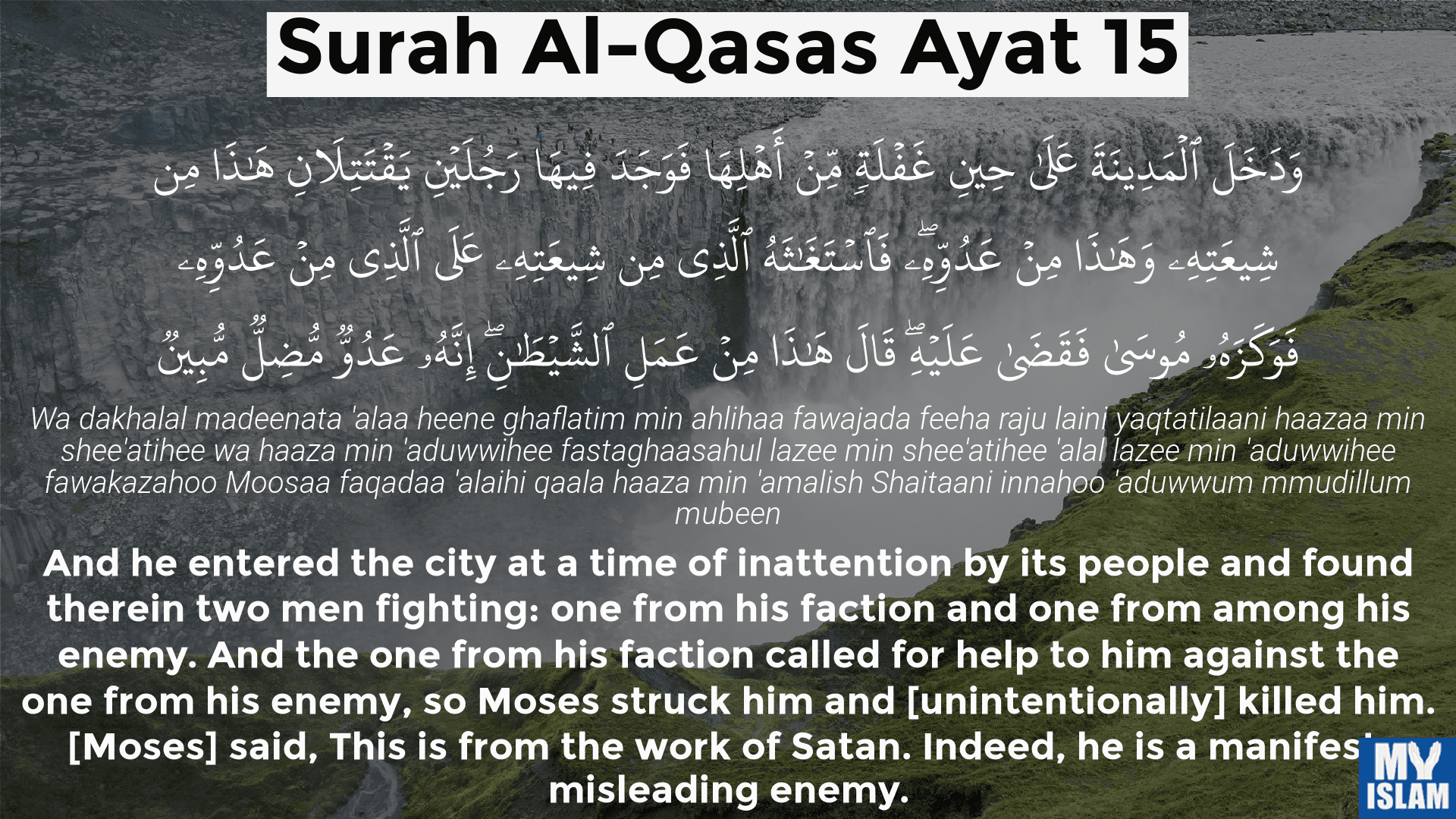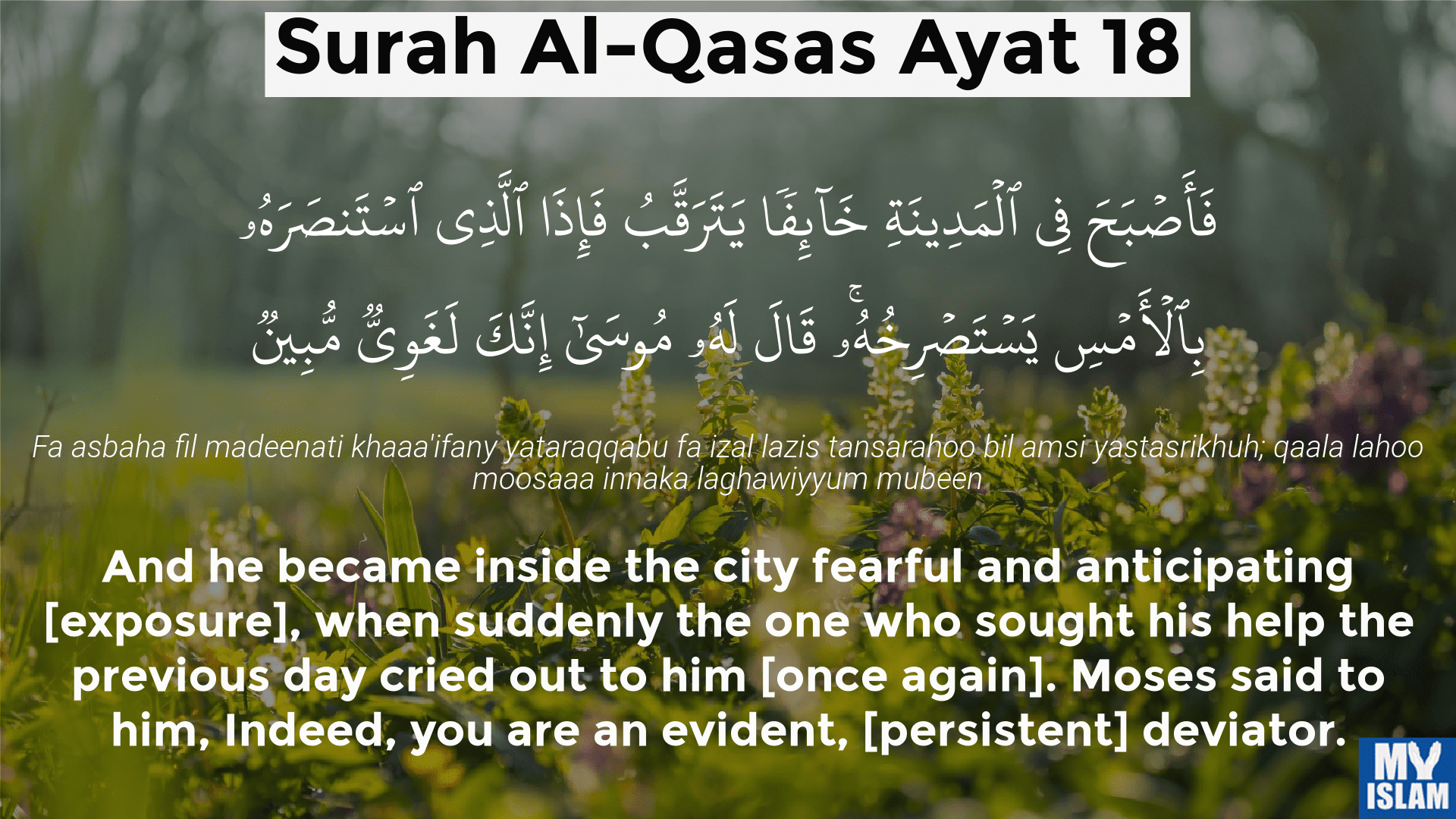Surah Al-Qasas Ayat 15 in Arabic Text
English Translation
Here you can read various translations of verse 15
And he entered the city at a time of inattention by its people and found therein two men fighting: one from his faction and one from among his enemy. And the one from his faction called for help to him against the one from his enemy, so Moses struck him and [unintentionally] killed him. [Moses] said, “This is from the work of Satan. Indeed, he is a manifest, misleading enemy.”
And he entered the city at a time when its people were not watching: and he found there two men fighting,- one of his own religion, and the other, of his foes. Now the man of his own religion appealed to him against his foe, and Moses struck him with his fist and made an end of him. He said: “This is a work of Evil (Satan): for he is an enemy that manifestly misleads!”
Once he entered the city at a time when its people were heedless, and he encountered two men fighting, one of whom belonged to his own people and the other to his foes. Now the man belonging to Moses’ own people cried out to him for help against the man from the foes, and Moses struck him with his fist and finished him. Moses said: “This is an act of Satan. Surely he is an enemy who openly misleads.”
And he entered the city at a time of unawareness of its people, and he found there two men fighting, – one of his party (his religion – from the Children of Israel), and the other of his foes. The man of his (own) party asked him for help against his foe, so Musa (Moses) struck him with his fist and killed him. He said: “This is of Shaitan’s (Satan) doing, verily, he is a plain misleading enemy.”
And he entered the city at a time of carelessness of its folk, and he found therein two men fighting, one of his own caste, and the other of his enemies; and he who was of his caste asked him for help against him who was of his enemies. So Moses struck him with his fist and killed him. He said: This is of the devil’s doing. Lo! he is an enemy, a mere misleader.
And he entered the city at a time while its population were (in a state of) heedlessness. Then he found therein two men fighting, the one of his (own) sect and the other (Literally: this) of his enemy. Then the one who was of his sect asked him for succor against him who was of his enemy; then Mûsa (Moses) punched him (and) so made an end of him. He said, “This is of Ash-Shaytan’s (Ash Shaytan= the ever-vicious “one”, i.e., the Devil) doing; surely he is an evidently misleading enemy.”
He entered the city, unnoticed by its people, and found two men fighting: one from his own people, the other an enemy. The one from his own people cried out to him for help against the enemy. Moses struck him with his fist and killed him. He said, ‘This must be Satan’s work: clearly he is a misleading enemy.’
اور موسیٰ (علیہ السلام) ایک ایسے وقت شہر میں آئے جبکہ شہر کے لوگ غفلت میں تھے۔ یہاں دو شخصوں کو لڑتے ہوئے پایا، یہ ایک تو اس کے رفیقوں میں سے تھا اور یہ دوسرا اس کے دشمنوں میں سے، اس کی قوم والے نے اس کے خلاف جو اس کے دشمنوں میں سے تھا اس سے فریاد کی، جس پر موسیٰ (علیہ السلام) نے اس کو مکا مارا جس سے وه مر گیا موسیٰ (علیہ السلام) کہنے لگے یہ تو شیطانی کام ہے، یقیناً شیطان دشمن اور کھلے طور پر بہکانے واﻻ ہے
Quran 28 Verse 15 Explanation
For those looking for commentary to help with the understanding of Surah Al-Qasas ayat 15, we’ve provided two Tafseer works below. The first is the tafseer of Abul Ala Maududi, the second is of Ibn Kathir.
Ala-Maududi
(28:15) Once he entered the city at a time when its people were heedless,[20] and he encountered two men fighting, one of whom belonged to his own people and the other to his foes. Now the man belonging to Moses’ own people cried out to him for help against the man from the foes, and Moses struck him with his fist[21] and finished him. Moses said: “This is an act of Satan. Surely he is an enemy who openly misleads.”[22]
20. It might be the early morning, or midday in summer, or night in winter, when the roads were deserted and there was all quiet in the city. The words “entered the city” indicate that the royal palaces were situated outside the capital, away from the common population. The words used are “entered the city” and not “came out in the city”, because the Prophet Moses (peace be upon him) lived in the royal palace.
21. The word wakaza in the original means both giving a slap and giving a blow. We have adopted “Moses gave a blow” for the reason that a blow can cause death but not a slap.
22. One can imagine the state of utter remorse and confusion in which the Prophet Moses (peace be upon him) uttered these words when he saw the Egyptian fall down after receiving the blow and breathe his last. He had no intention to murder, nor is a blow struck to kill, nor can one expect that a healthy person would die on receiving a blow. That is why the Prophet Moses (peace be upon him) exclaimed: “This is the work of Satan! He has made me do this in order to work some great mischief, so that I am accused of killing an Egyptian while defending an Israelite, and a violent storm of anger and indignation is aroused in the whole of Egypt not only against me but the whole Israelite community.” In this connection, the Bible gives a different version from the Quran. It declares the Prophet Moses (peace be upon him) to be guilty of willful murder. It says that when Moses saw an Egyptian and an Israelite fighting, “He (Moses) looked this way and that way, and when he saw that there was no man, He slew the Egyptian, and hid him in the sand.” (Exodus 2: 12). The same is the version of the Talmud also. Now anybody can see how the Israelites brand the characters of their elders with infamy and how the Quran exonerates them. The verdict of common sense also is that a wise and discreet person, who was to become a great Prophet in the future, and who had to give man a great code of law and justice, could not be such a blind nationalist that seeing a member of his own community fighting with a man of the other community, he would be so infuriated that he would kill the other person willfully. Evidently, it could not be lawful to kill the Egyptian only for the sake of rescuing an Israelite from his tyranny.
Ibn-Kathir
The tafsir of Surah Qasas verse 15 by Ibn Kathir is unavailable here.
Please refer to Surah Qasas ayat 14 which provides the complete commentary from verse 14 through 19.
Quick navigation links






